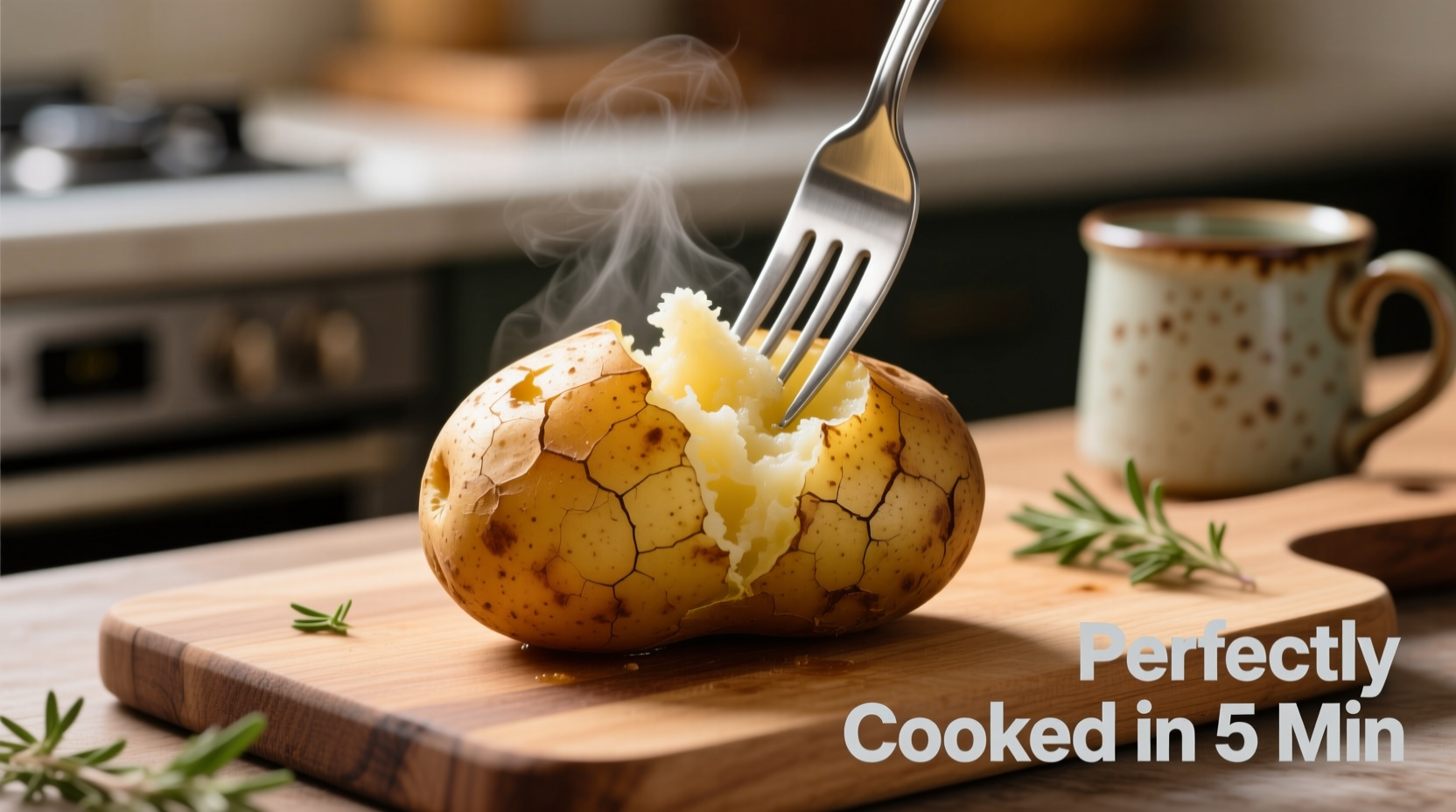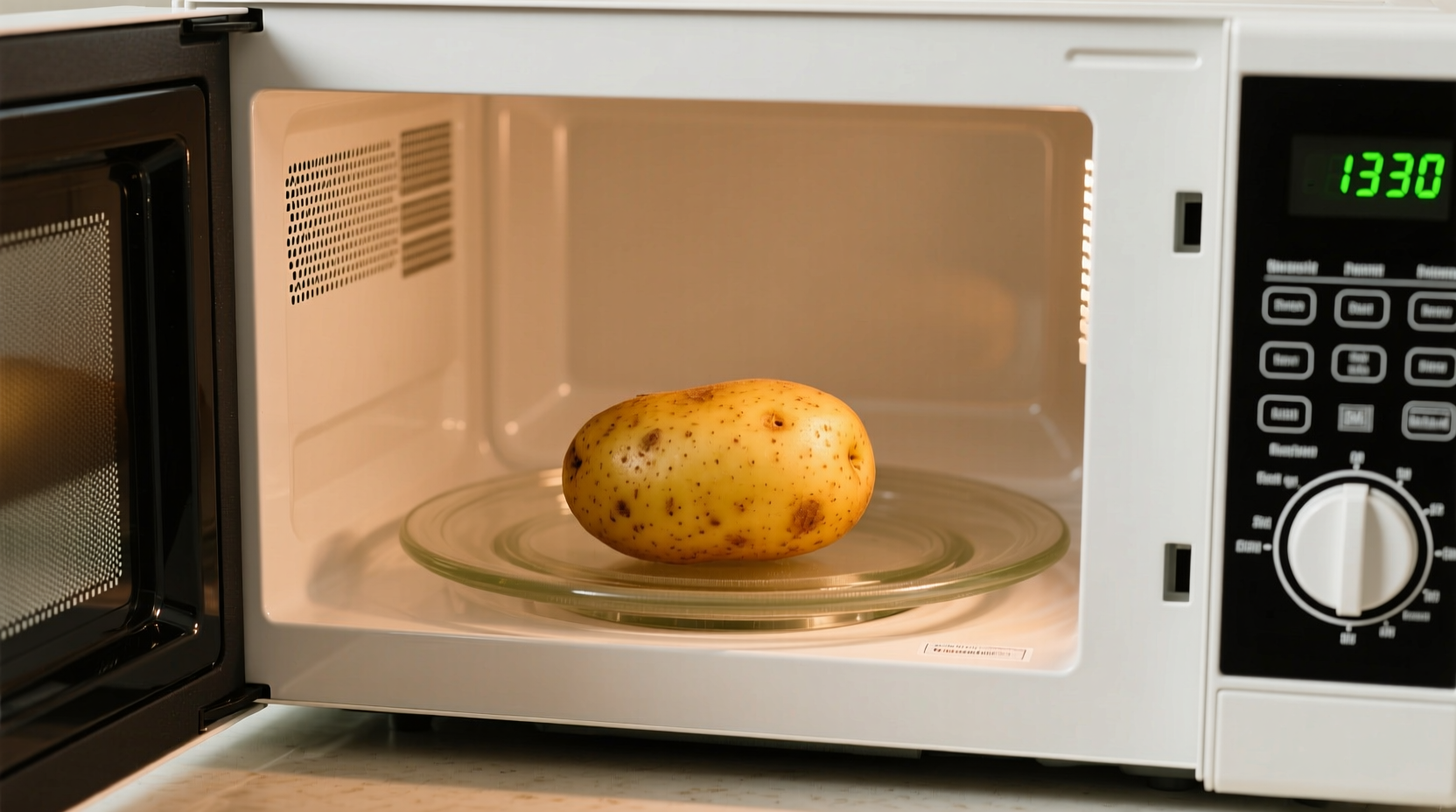For a standard medium-sized potato (5-6 ounces), microwave for 5-7 minutes on high power, flipping halfway through. Larger potatoes may require 8-10 minutes. Always pierce the skin with a fork before cooking to prevent explosions.
Wondering how long do you microwave a potato without ending up with a soggy mess or worse—a kitchen disaster? You're not alone. Millions of home cooks turn to the microwave for quick potato preparation every day, but getting the timing right can be tricky. This guide delivers precise, tested instructions that guarantee perfectly cooked potatoes every time, whether you're making a quick side dish or preparing potatoes for a recipe.
Why Microwaving Potatoes Works (When Done Right)
Microwaving potatoes offers a faster alternative to baking or boiling, cutting cooking time by 75%. The key is understanding how microwave energy interacts with the potato's high water content. According to the U.S. Food and Drug Administration, microwave cooking preserves more nutrients than boiling because it requires less water and shorter cooking times.
Safety First: Preventing Potato Explosions
Before discussing how long do you microwave a potato, you must understand the critical safety step: piercing the skin. Potatoes contain moisture that turns to steam during cooking. Without ventilation, pressure builds until—boom—you've got potato shrapnel inside your microwave.
The USDA Food Safety and Inspection Service recommends piercing potatoes at least 4-6 times with a fork, creating channels for steam to escape. This simple step prevents dangerous pressure buildup while maintaining the potato's structure.
Step-by-Step Microwave Potato Guide
Follow these professional-tested steps for perfect results every time:
Preparation Essentials
- Clean thoroughly: Scrub potatoes under running water to remove dirt
- Pierce strategically: Insert fork at 1-inch intervals around the entire potato
- Dry completely: Moisture on the skin causes uneven cooking
- Optional wrap: For softer skin, wrap in a damp paper towel (not necessary for crispy skin)
Timing Guidelines Based on Potato Size
| Potato Size | Weight | Microwave Time | Internal Temp |
|---|---|---|---|
| Small | 4-5 oz | 4-5 minutes | 205°F (96°C) |
| Medium | 5-7 oz | 5-7 minutes | 205°F (96°C) |
| Large | 8-10 oz | 8-10 minutes | 205°F (96°C) |
| Jumbo | 10+ oz | 10-12 minutes | 205°F (96°C) |
Note: These times are for one potato on high power (1000W). Add 1-2 minutes per additional potato. Always flip halfway through cooking.
Pro Tips for Perfect Microwave Potatoes
Professional chefs know these insider techniques make the difference between mediocre and magnificent microwave potatoes:
- Rotate for even cooking: Turn potatoes 180 degrees halfway through cooking time
- Test doneness properly: Insert a skewer—should slide in with no resistance
- Rest before serving: Let potatoes stand for 2 minutes after cooking to finish steaming internally
- Boost flavor: Rub with olive oil and sprinkle with sea salt immediately after cooking

When Not to Microwave Potatoes
While convenient, microwaving isn't always the best method. According to Cornell University's Food Science Department, certain situations require alternative cooking methods:
- For crispy skins: Baking produces superior texture for jacket potatoes
- When cooking multiple potatoes: Oven baking handles larger quantities more efficiently
- For certain varieties: Waxy potatoes like fingerlings cook more evenly when boiled
- When precise texture control is needed: Steaming provides more consistent results for potato salads
Troubleshooting Common Microwave Potato Problems
Even with proper timing, issues can arise. Here's how to fix them:
- Soggy texture: Overcooking or wrapping in too much moisture—reduce time by 1 minute
- Hard spots: Uneven microwave distribution—rotate more frequently
- Exploded potato: Inadequate piercing—increase number of fork pricks
- Cold center: Potatoes too large for microwave power—cut in half before cooking
How Microwave Power Affects Cooking Time
Your microwave's wattage significantly impacts how long do you microwave a potato. Most guidelines assume 1000W power, but many home units range from 600-1200W:
- 700W microwave: Add 1-2 minutes to standard times
- 800W microwave: Add 1 minute to standard times
- 1100W+ microwave: Reduce time by 1 minute
Check your microwave's wattage label (usually inside the door) for precise timing adjustments.
Storing and Reheating Leftover Microwave Potatoes
Proper storage maintains quality and safety. The FDA recommends:
- Cool completely before refrigerating (within 2 hours)
- Store in airtight container for up to 5 days
- Reheat at 50% power for 2-3 minutes to prevent drying
- Never reheat more than once for food safety
FAQ: Microwave Potato Questions Answered
Can you microwave a potato without piercing it?
No, piercing is essential for safety. Without venting holes, steam pressure builds until the potato explodes. The USDA recommends at least 4-6 deep piercings with a fork to prevent dangerous pressure buildup.
How do you know when a microwaved potato is done?
A perfectly cooked potato will yield easily to a thin skewer or knife with no resistance. The internal temperature should reach 205°F (96°C). When squeezed gently (using oven mitts), it should give slightly but maintain its shape.
Why does my microwaved potato have hard spots?
Hard spots occur from uneven microwave distribution. Rotate your potato 180 degrees halfway through cooking. If problems persist, try rearranging other items in your microwave or using a lower power setting (70-80%) for more even heating.
Can you microwave multiple potatoes at once?
Yes, but adjust cooking time. For two medium potatoes, add 2-3 minutes to the standard time. Arrange potatoes in a circle with space between them for even exposure. Larger quantities are better cooked in batches for consistent results.
Is it safe to eat undercooked microwaved potatoes?
No, undercooked potatoes contain solanine, a natural toxin that can cause digestive issues. Always ensure potatoes reach an internal temperature of at least 205°F (96°C) throughout. Use a food thermometer to verify doneness in multiple spots.











 浙公网安备
33010002000092号
浙公网安备
33010002000092号 浙B2-20120091-4
浙B2-20120091-4